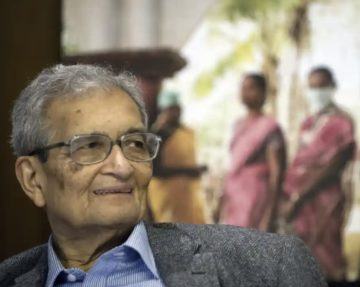Abhrajyoti Chakraborty in The Guardian:
 Amartya Sen was 18 when he diagnosed his own cancer. Not long after he had moved to Calcutta for college, he noticed a lump growing inside his mouth. He consulted two doctors but they laughed away his suspicions, so Sen, then a student of economics and mathematics, looked up a couple of books on cancer from a medical library. He identified the tumour – a “squamous cell carcinoma” – and later when a biopsy confirmed his verdict he wondered if there were in effect two people with his name: a patient who had just been told he had cancer, but also the “agent” responsible for the diagnosis. “I must not let the agent in me go away,” Sen decided, “and could not – absolutely could not – let the patient take over completely.”
Amartya Sen was 18 when he diagnosed his own cancer. Not long after he had moved to Calcutta for college, he noticed a lump growing inside his mouth. He consulted two doctors but they laughed away his suspicions, so Sen, then a student of economics and mathematics, looked up a couple of books on cancer from a medical library. He identified the tumour – a “squamous cell carcinoma” – and later when a biopsy confirmed his verdict he wondered if there were in effect two people with his name: a patient who had just been told he had cancer, but also the “agent” responsible for the diagnosis. “I must not let the agent in me go away,” Sen decided, “and could not – absolutely could not – let the patient take over completely.”
This self-division is characteristic of Home in the World – “world” being here no more than the university campuses Sen has lived in all his life – and places it in the tradition of CLR James’s Beyond a Boundary and Nirad C Chaudhuri’s The Autobiography of an Unknown Indian: books that, in their primacy of thought over feeling, reflect the psychic extent of the colonial encounter. The empire loomed early in Sen’s life, though he was born and schooled in Santiniketan, the idyllic campus set up by the poet Rabindranath Tagore in rural Bengal.
More here.
